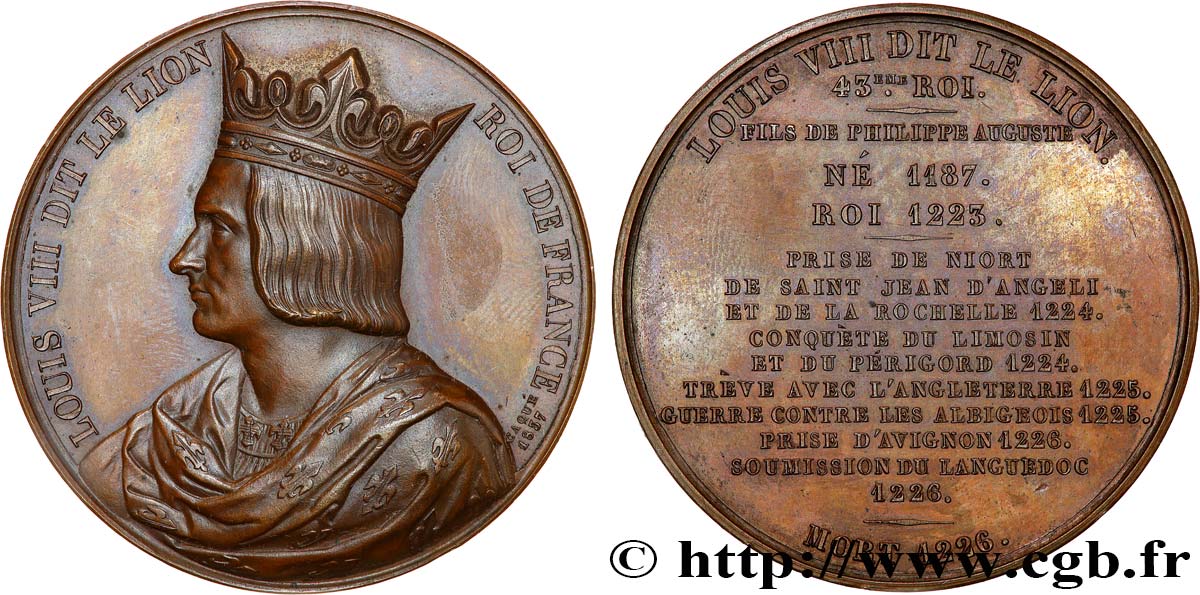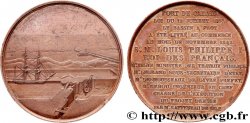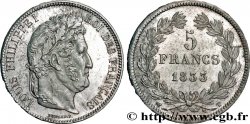fme_689218 - LOUIS-PHILIPPE I Médaille, Roi Louis VIII le Lion
100.00 €(Approx. 107.00$ | 86.00£)
Quantity
Add to your cart

Type : Médaille, Roi Louis VIII le Lion
Date: 1837
Metal : bronze
Diameter : 51,5 mm
Orientation dies : 12 h.
Engraver CAQUÉ Armand Auguste (1795-1881)
Weight : 64,90 g.
Edge : lisse
Puncheon : sans poinçon
Coments on the condition:
Jolie patine marron avec quelques traces de manipulation
Catalogue references :
Obverse
Obverse legend : LOUIS VIII DIT LE LION - ROI DE FRANCE.
Obverse description : Buste couronné à gauche de Louis VIII, signé : CAQUE / 1837.
Reverse
Reverse legend : LOUIS VIII DIT LE LION / 43EME ROI / - / FILS DE PHILIPPE AUGUSTE / NE 1187. / ROI 1223. / - / PRISE DE NIORT / DE SAINT JEAN D’ANCELI / ET DE LA ROCHELLE 1224. / CONQUETE DU LIMOSIN / ET DU PERIGORD 1224. / TREVE AVEC L’ANGLETERRE 1225. / GUERRE CONTRE LES ABRIGEOIS 1225. / PRISE D’AVIGNON 1226. / SOUMISSION DU LANGUEDOC / 1226. / - / MORT 1226..
Reverse description : Légende en 16 lignes.
Commentary
Cette médaille fait partie de la série de 73 médailles en bronze au module de 51mm gravées de 1835 à 1840 par Caqué.
Armand Auguste Caqué, né à Saintes (Charente-Inférieure) le 24 janvier 1795 et mort à Paris le 31 décembre 1881 à l'âge de 86 ans, est un sculpteur, graveur et médailleur français. Graveur officiel de l'empereur Napoléon III. Ses médailles sont signées CAQUÉ F et quelquefois sa signature est suivie de la mention "Graveur de S. M. l'Empereur".
Louis VIII dit « le Lion », né le 5 septembre 1187 à Paris et mort le 8 novembre 1226 à Montpensier (Auvergne), est roi de France de 1223 à 1226, huitième de la dynastie dite des Capétiens directs.
Il était le fils du roi Philippe II (1165-1223), dit « Philippe Auguste » et d'Isabelle de Hainaut (1170-1190). Par sa mère, il est le premier roi de France qui descende à la fois d'Hugues Capet et de son compétiteur malheureux, Charles de Basse-Lotharingie. Le court règne de Louis VIII fut cependant marqué par deux brillantes campagnes : l’une contre les Anglais en Guyenne, l’autre contre Raymond VII de Toulouse.
Il est le premier roi capétien à ne pas avoir été sacré roi du vivant de son père. Il avait cependant été désigné par Philippe II dans son testament rédigé en 1190 comme devant lui succéder. Le testament n'ayant pas été contesté après cette date, la cérémonie de l'adoubement des barons — héritage rituel des Capétiens — devenait inutile. L'archevêque de Reims, Guillaume de Joinville, le sacre à Reims le 6 août 1223..
Armand Auguste Caqué, né à Saintes (Charente-Inférieure) le 24 janvier 1795 et mort à Paris le 31 décembre 1881 à l'âge de 86 ans, est un sculpteur, graveur et médailleur français. Graveur officiel de l'empereur Napoléon III. Ses médailles sont signées CAQUÉ F et quelquefois sa signature est suivie de la mention "Graveur de S. M. l'Empereur".
Louis VIII dit « le Lion », né le 5 septembre 1187 à Paris et mort le 8 novembre 1226 à Montpensier (Auvergne), est roi de France de 1223 à 1226, huitième de la dynastie dite des Capétiens directs.
Il était le fils du roi Philippe II (1165-1223), dit « Philippe Auguste » et d'Isabelle de Hainaut (1170-1190). Par sa mère, il est le premier roi de France qui descende à la fois d'Hugues Capet et de son compétiteur malheureux, Charles de Basse-Lotharingie. Le court règne de Louis VIII fut cependant marqué par deux brillantes campagnes : l’une contre les Anglais en Guyenne, l’autre contre Raymond VII de Toulouse.
Il est le premier roi capétien à ne pas avoir été sacré roi du vivant de son père. Il avait cependant été désigné par Philippe II dans son testament rédigé en 1190 comme devant lui succéder. Le testament n'ayant pas été contesté après cette date, la cérémonie de l'adoubement des barons — héritage rituel des Capétiens — devenait inutile. L'archevêque de Reims, Guillaume de Joinville, le sacre à Reims le 6 août 1223..








 Report a mistake
Report a mistake Print the page
Print the page Share my selection
Share my selection Ask a question
Ask a question Consign / sell
Consign / sell
 Full data
Full data



